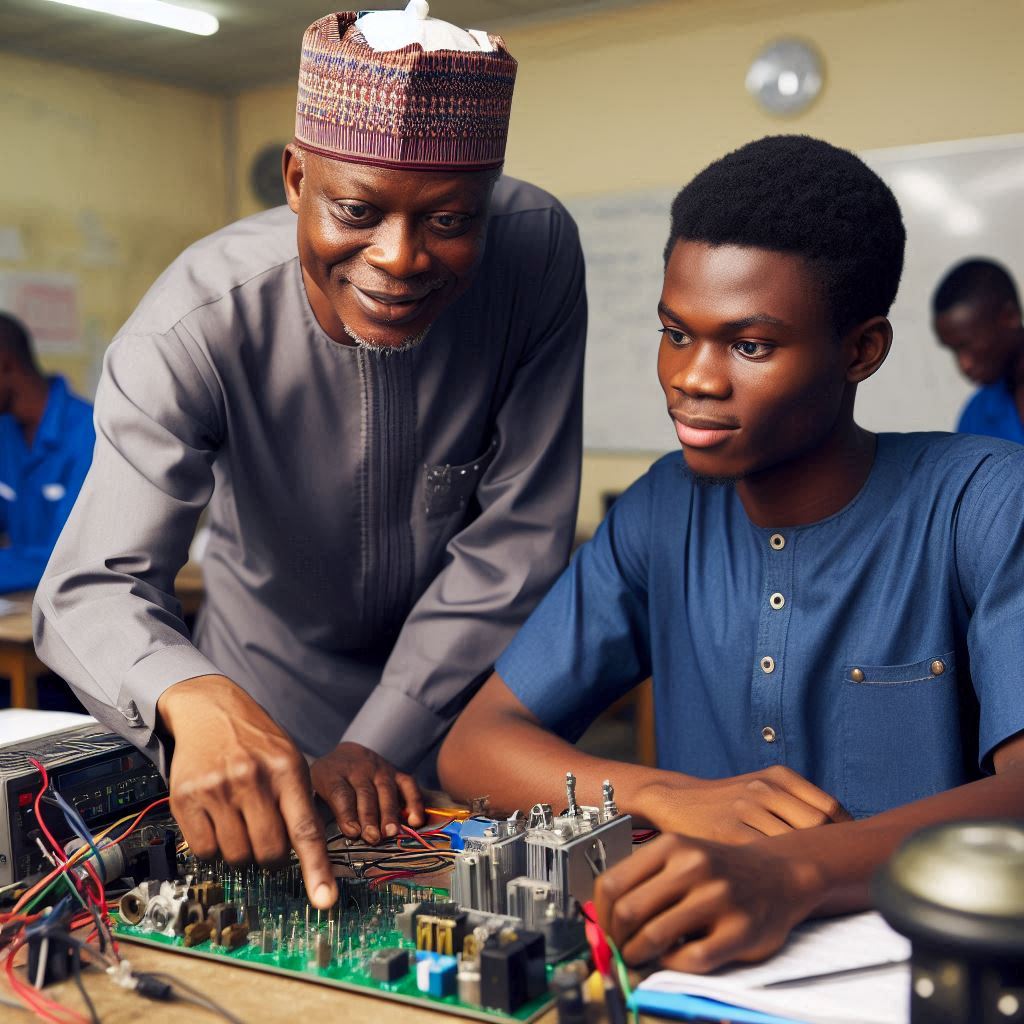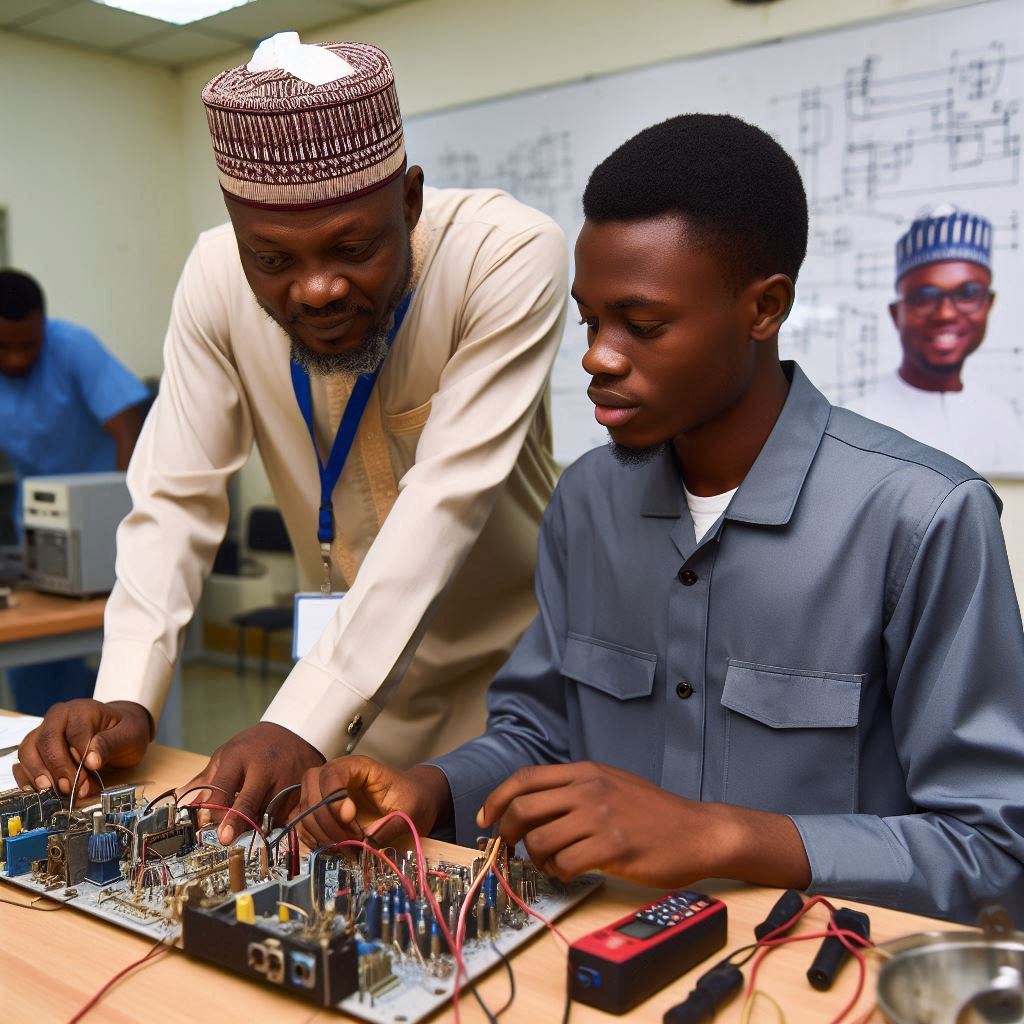Introduction
Technical education focuses on teaching practical skills and knowledge. It equips students with expertise in specific fields. These fields range from engineering to information technology.
Technical education provides hands-on training, fostering a deeper understanding of various subjects.
In today’s fast-paced world, technical education is crucial. It helps bridge the gap between theoretical knowledge and practical application.
This type of education ensures students are job-ready upon graduation. With rapid technological advancements, the demand for skilled professionals has increased. Technical education meets this demand effectively.
The Importance of Technical Education in Today’s World
Technical education plays a vital role in modern society. It supports the development of industries and boosts economic growth. By providing specialized skills, it enhances productivity and innovation.
Countries with strong technical education systems have higher employment rates. They also experience better overall economic stability.
Technical education is essential for individual growth too. It offers students opportunities to explore their interests deeply. This focused learning approach helps them excel in their chosen fields.
Students gain confidence in their abilities through practical experience. This confidence is key to their professional success.
Essential Skills Gained from Technical Education
Problem-Solving Skills
Technical education sharpens problem-solving abilities. Students learn to analyze issues critically. They develop strategies to find effective solutions.
Practical exercises and real-world projects enhance these skills. Graduates can tackle complex challenges in their professional lives.
Technical Proficiency
Students gain extensive technical knowledge. They become proficient with tools, software, and machinery relevant to their fields.
This hands-on experience is invaluable in today’s technology-driven world. Employers seek candidates with such technical expertise.
Analytical Thinking
Technical education promotes analytical thinking. Students learn to evaluate data and draw logical conclusions. This skill is crucial in fields like engineering, IT, and healthcare. Analytical thinking enables professionals to make informed decisions.
Adaptability and Innovation
Rapid technological changes require adaptability. Technical education prepares students to adapt to new tools and techniques. They become innovators, contributing to advancements in their industries. This adaptability is highly valued by employers.
Teamwork and Collaboration
Collaboration is a key aspect of technical education. Students work on group projects, learning to collaborate effectively. They develop strong communication and teamwork skills. These skills are essential in any professional environment.
Time Management
Managing time efficiently is crucial in technical fields. Technical education emphasizes meeting deadlines and managing multiple tasks.
Students learn to prioritize their work and stay organized. These time management skills are beneficial throughout their careers.
Attention to Detail
Technical fields demand precision and accuracy. Students develop a keen attention to detail. This skill ensures high-quality work and reduces errors. Attention to detail is critical in professions like engineering and IT.
Technical education provides essential skills for the modern workforce. It ensures students are well-prepared for their careers. Problem-solving, technical proficiency, and adaptability are just a few benefits.
As technology continues to evolve, the importance of technical education will only grow. Embracing technical education is key to personal and professional success in today’s world.
Practical Skills
Hands-On Experience in Using Tools and Equipment
Technical education focuses on hands-on experience. Students learn by doing. They use real tools and equipment found in the industry.
This practical training ensures they are ready for the workforce. They gain familiarity with machinery and technology. Each task performed builds their confidence and competence.
Real-world scenarios in training make them adept at handling tools. This experience is invaluable when they start their careers. It bridges the gap between theoretical knowledge and practical application.
Students become comfortable and efficient with essential tools. They develop a deep understanding of their equipment’s capabilities and limitations.
Ability to Troubleshoot and Solve Problems in Real-World Situations
Troubleshooting is a critical skill learned in technical education. Students face real-world problems and learn to solve them. They learn to diagnose issues quickly and accurately.
This ability is crucial in maintaining workflow efficiency. Real-world problem-solving exercises prepare them for industry challenges. They develop logical and analytical thinking skills.
Every problem solved enhances their troubleshooting abilities. They learn to think on their feet and make informed decisions. This skill is vital in reducing downtime and increasing productivity.
Employers highly value graduates who can resolve issues independently.
Understanding How Things Work and How to Fix Them
Technical education provides a comprehensive understanding of systems and machinery. Students learn the inner workings of various devices.
This knowledge allows them to identify and fix issues efficiently. They understand the principles behind mechanical and electrical systems.
This foundational knowledge is essential for effective problem-solving. Students learn how to disassemble, repair, and reassemble machinery.
They become proficient in identifying faults and implementing solutions. This expertise reduces the need for external repair services. It also fosters innovation as students explore ways to improve existing systems.
Their understanding extends to anticipating potential issues and preventing them.
Bridging Theory and Practice
Technical education excels in bridging the gap between theory and practice. Students see the practical application of their theoretical knowledge.
This integration makes learning more effective and meaningful. They understand the relevance of what they study. Practical sessions reinforce theoretical concepts, making them easier to grasp.
Students witness firsthand how theoretical principles apply in real situations. This approach solidifies their learning and enhances retention. It prepares them for the realities of the industry.
They graduate with both knowledge and practical skills. This dual preparation gives them a competitive edge in the job market.
Practical skills gained from technical education are indispensable. Hands-on experience with tools and equipment builds confidence. The ability to troubleshoot and solve real-world problems is invaluable.
Understanding how things work and how to fix them is crucial. Bridging theory and practice ensures a well-rounded education. These skills make technical education graduates highly desirable in the workforce.
They are ready to face industry challenges head-on. Their practical expertise sets them apart and opens doors to numerous opportunities.
Read: Nigerian Educational Technology Associations
Critical Thinking
Analytical Skills Developed through Complex Problem-Solving Tasks
Technical education enhances analytical skills by engaging students in complex problem-solving tasks. These tasks require deep thinking and systematic approaches.
Students learn to dissect problems, identify patterns, and evaluate potential solutions. Each problem-solving activity builds their ability to analyze data and draw meaningful conclusions.
This process sharpens their analytical mindset, enabling them to tackle real-world issues effectively.
In technical education, projects often simulate real-world challenges. Students must assess variables, constraints, and outcomes to develop viable solutions.
This experience hones their ability to approach problems methodically. By breaking down complex tasks, students gain confidence in their analytical capabilities.
They learn to view problems from different angles, considering multiple perspectives before reaching a conclusion.
Ability to Think Creatively to Come Up with Innovative Solutions
Creativity thrives in technical education environments. Students are encouraged to think outside the box and develop innovative solutions.
Creative thinking is essential in fields such as engineering, information technology, and design. These disciplines demand novel approaches to meet evolving challenges.
Technical education nurtures this creativity through hands-on projects and collaborative activities.
Instructors often pose open-ended questions, prompting students to brainstorm and experiment with different ideas. This freedom fosters a creative mindset, allowing students to explore unconventional solutions.
They learn to combine existing knowledge with new insights, generating fresh approaches to problems. This ability to think creatively is a valuable skill, applicable across various industries and career paths.
Decision-Making Skills Honed through Practical Application
Practical application is a cornerstone of technical education. Students make decisions based on real-world scenarios, enhancing their decision-making skills.
They face situations that require quick thinking and sound judgment. These experiences prepare them for the fast-paced demands of the professional world.
During projects, students must evaluate different strategies, weighing pros and cons before deciding. They learn to anticipate potential risks and benefits, making informed choices.
This practical exposure builds their confidence in decision-making. They become adept at handling uncertainty and adapting to changing circumstances.
Integrating Critical Thinking Skills
Technical education integrates these critical thinking skills seamlessly. Analytical, creative, and decision-making abilities develop concurrently through structured curricula.
Students engage in activities that challenge their intellect and creativity. They work on projects that mimic industry conditions, applying theoretical knowledge in practical contexts.
Group projects enhance these skills further. Collaboration requires students to articulate their ideas clearly and consider diverse viewpoints.
They learn to negotiate, compromise, and integrate different perspectives. This collective problem-solving enhances their critical thinking, preparing them for collaborative environments in their careers.
In a nutshell, Technical education is a powerful catalyst for developing critical thinking skills. It equips students with analytical abilities, creative thinking, and sound decision-making.
These skills are indispensable in today’s dynamic job market. By engaging in complex problem-solving tasks, students build a strong foundation for their professional lives.
They become adept at analyzing situations, generating innovative solutions, and making informed decisions.
Through practical application, technical education molds students into versatile and resourceful individuals, ready to tackle the challenges of the modern world.
Read: Curriculum Studies Scholarships in Nigeria
Communication Skills
Communication skills are essential in the field of technical education.
Students not only need to understand complex technical concepts but also effectively communicate them to others. Here are some key aspects of communication skills gained through technical education:
Collaboration with Peers on Projects
One of the fundamental skills developed in technical education is the ability to work collaboratively with peers on projects. This involves effective communication, sharing of ideas, and division of tasks to achieve a common goal.
Students learn how to communicate their thoughts, listen to others, and work together towards a successful project completion.
Presentation Skills When Showcasing Projects or Findings
Technical education emphasizes the importance of presentation skills when showcasing projects or findings. Students learn how to effectively communicate their work through presentations, reports, or demonstrations.
This includes structuring information in a clear and concise manner, using visual aids effectively, and engaging the audience to convey complex technical concepts in a digestible format.
Ability to Explain Technical Concepts to Non-Technical Individuals
Another crucial aspect of communication skills gained from technical education is the ability to explain technical concepts to non-technical individuals.
This skill is essential in various professional settings where the audience may not have a technical background.
Students learn how to simplify complex technical jargon, use analogies or real-world examples to make understanding easier, and tailor their communication style to suit the audience’s level of knowledge.
In review, communication skills play a vital role in technical education as they enable students to effectively collaborate with peers, present their work confidently, and communicate complex technical concepts to a broader audience.
These skills are not only valuable in academic settings but also in future career opportunities where effective communication is essential for success.
Read: Professional Certifications in Business Education

Attention to Detail
Attention to detail is crucial in technical education. It involves precision, accuracy, thoroughness, and a strong focus on quality assurance. Let’s explore these aspects in detail.
Precision and Accuracy in Following Technical Instructions
Technical education demands precision and accuracy. Students must follow technical instructions meticulously. Every step matters. Missing a single instruction can lead to failure.
Accurate execution ensures the desired outcome. Precision in measurements and calculations is vital. It prevents errors and ensures efficiency. Technical instructions often contain specific guidelines.
Adhering to these guidelines is non-negotiable. It builds a foundation of reliability and trust. Practicing accuracy trains the mind to focus on details. It creates a habit of double-checking work.
Precision fosters a culture of excellence. It highlights the importance of doing things right the first time.
Importance of Thoroughness in Completing Tasks
Thoroughness is another key component. Technical education emphasizes completing tasks with thoroughness. It means not cutting corners. Every aspect of a task must be addressed.
Thoroughness ensures no detail is overlooked. It instills a sense of responsibility. Students learn to take their tasks seriously. They understand the importance of thorough work.
This skill translates to better job performance. Thoroughness involves checking and rechecking work. It’s about being comprehensive and complete. This approach minimizes errors.
It boosts confidence in the quality of work. Thoroughness prepares students for real-world challenges. It teaches them to handle complex tasks effectively.
Focus on Quality Assurance and Control in Technical Projects
Quality assurance and control are integral in technical projects. They ensure that projects meet high standards. Technical education focuses on these aspects rigorously.
Quality assurance involves systematic processes. It’s about preventing defects and ensuring quality. Students learn to develop and follow quality standards.
Quality control involves inspecting and testing. It’s about identifying defects and correcting them. Students learn to perform regular quality checks.
This practice ensures consistent quality in their work. They understand the importance of maintaining high standards. Quality assurance and control foster a sense of pride.
Students take pride in producing high-quality work. They learn to value excellence over mediocrity.
Attention to detail in technical education encompasses precision, accuracy, thoroughness, and quality assurance. These skills are invaluable. They prepare students for successful careers.
Precision and accuracy ensure that tasks are performed correctly. Thoroughness guarantees that no aspect is overlooked. Quality assurance and control maintain high standards.
Together, these skills create competent professionals. They are essential for anyone pursuing a technical career. Emphasizing these skills in education ensures a well-prepared workforce.
Attention to detail is not just a skill; it’s a mindset. It’s a commitment to excellence in every task.
Read: Role of Technology in Business Education in Nigeria
Transform Your Career with Expert Guidance
Get personalized mentorship consulting that’s tailored to your unique path. Our expert advice is actionable and exclusive.
Get StartedAdaptability
Adaptability is a crucial skill in the fast-paced world of technology. Technical education equips students with the flexibility needed to navigate ever-evolving tools and technologies. Here, we explore how adaptability fosters growth and success.
Flexibility in Working with Changing Technologies and Tools
Technical education trains students to be versatile. New technologies and tools emerge regularly, requiring professionals to stay updated.
Students learn to work with various software and hardware, gaining exposure to different platforms. This flexibility makes them valuable assets in any workplace.
They can transition seamlessly between projects, ensuring continuity and productivity. By embracing change, they remain competitive in the job market.
Ability to Quickly Learn New Skills and Techniques
Learning is a continuous journey in the tech industry. Technical education instills a mindset of lifelong learning. Students become adept at acquiring new skills swiftly.
They tackle complex concepts and master them efficiently. This ability to learn quickly is essential for adapting to new roles or tasks. It also enables them to contribute effectively to innovative projects.
Their proficiency in learning new techniques ensures they remain relevant and valuable.
Resilience in Facing Challenges and Setbacks
Challenges are inevitable in any field, especially technology. Technical education teaches resilience, preparing students to handle obstacles.
They learn to approach problems methodically and persistently. Resilience helps them recover from setbacks and continue working towards their goals.
It fosters a mindset that views challenges as opportunities for growth. This perseverance is vital for long-term success in a dynamic industry.
Embracing a Growth Mindset
A growth mindset is fundamental to adaptability. Technical education encourages students to embrace learning and improvement. They understand that skills can be developed through effort and dedication.
This mindset drives them to seek out new knowledge and experiences. It also helps them stay motivated and positive, even in difficult situations. By fostering a growth mindset, they continually enhance their capabilities.
Collaborative Skills in a Dynamic Environment
Adaptability extends to working effectively with others. Technical education promotes collaboration and teamwork. Students work on group projects, learning to communicate and cooperate.
They adapt to different team dynamics and contribute to collective success. These collaborative skills are crucial in a professional setting. They ensure smooth project execution and innovative problem-solving.
Adapting to Industry Trends
The tech industry is shaped by constant innovation. Technical education keeps students informed about the latest trends and developments.
They learn to anticipate changes and adapt their skills accordingly. This proactive approach ensures they remain ahead of the curve. By staying updated, they can leverage new opportunities and technologies.
Their adaptability allows them to thrive in a rapidly changing landscape.
Adaptability is a cornerstone of success in the tech industry. Technical education provides the tools and mindset needed to navigate change.
By being flexible, quick learners, resilient, and collaborative, students excel in their careers. Embracing adaptability ensures they remain relevant and competitive in an ever-evolving world.
Time Management
Time management is a crucial skill in technical education. It helps students handle complex projects effectively. Mastering time management leads to increased productivity and success in their future careers.
This section explores three key aspects of time management: prioritization, efficient workflow organization, and discipline in completing projects on time.
Prioritization of Tasks to Meet Deadlines
Prioritization is essential in technical education. Students often face multiple deadlines simultaneously. Learning to prioritize tasks helps them manage their workload efficiently.
This involves identifying the most critical tasks and focusing on them first. Technical education teaches students to break down complex projects into manageable parts.
They can then assign priority levels to each part. This approach ensures that the most important tasks receive attention.
Meeting deadlines becomes more feasible with effective prioritization. Students also learn to balance urgent and important tasks, preventing unnecessary stress.
Efficient Workflow Organization for Optimal Productivity
Efficient workflow organization is another key component of time management. Technical education emphasizes creating structured plans for project completion.
Students learn to map out each step of a project in advance. This planning reduces wasted time and effort. They also develop strategies for managing resources and tools effectively.
Workflow organization involves setting clear goals and deadlines for each project phase. This structured approach helps students track their progress and make necessary adjustments.
It also promotes a smoother transition between different project stages. By organizing their workflow, students can maintain a steady pace and avoid last-minute rushes.
Discipline in Completing Projects in a Timely Manner
Discipline is critical in ensuring projects are completed on time. Technical education instills a sense of responsibility and commitment in students.
They learn the importance of adhering to schedules and deadlines. This discipline extends to maintaining consistent work habits. Students are taught to allocate specific time blocks for different tasks.
This method prevents procrastination and encourages regular progress. Consistent effort and dedication lead to timely project completion. Discipline also involves self-motivation and accountability.
Students learn to hold themselves accountable for their progress. This mindset is essential for their professional success.
Time management is a vital skill gained from technical education. It encompasses prioritization, efficient workflow organization, and discipline in meeting deadlines.
These skills ensure students can handle complex projects effectively and efficiently. By mastering time management, students enhance their productivity and pave the way for future success.
Technical education prepares them to excel in their careers by instilling these essential skills.
Teamwork
Collaboration with Diverse Groups of Individuals in Technical Projects
In technical education, teamwork becomes a cornerstone of successful projects. Students collaborate with peers from various backgrounds.
This collaboration fosters a rich exchange of ideas and techniques. Each team member brings unique skills and perspectives to the table.
Working in diverse groups helps students appreciate different viewpoints. This experience mirrors the real-world work environment. In industry, diverse teams drive innovation and creativity.
Students learn to communicate effectively with teammates. They also understand the importance of clear and concise communication.
Successful technical projects rely on everyone’s input and expertise. Therefore, students develop strong interpersonal skills through collaboration.
Valuing Different Perspectives and Skills in a Team Setting
Teamwork in technical education emphasizes the value of diverse perspectives. Each team member offers unique insights and abilities.
Recognizing and valuing these differences enhance the team’s overall performance. Students learn to appreciate the strengths and skills of their peers.
This appreciation fosters mutual respect and understanding. In a team setting, students must balance their ideas with others’. They practice active listening and constructive feedback.
This balance is crucial for achieving common goals. By valuing different perspectives, students become more open-minded. They also become more adaptable to various working styles. This adaptability is a vital skill in any technical career.
Leadership and Followership Skills Developed Through Group Work
Technical education provides a platform for developing leadership and followership skills. In group projects, students often take on different roles.
They may lead a project or support their peers in a task. Leadership in a technical setting involves guiding the team towards a shared vision.
It requires decision-making, delegation, and motivation skills. Students learn to inspire and influence their teammates effectively. Followership is equally important in teamwork.
Good followers support the leader and contribute to the team’s objectives. They show initiative and responsibility for their tasks. This dynamic teaches students the importance of both roles in a successful team.
They understand that both leadership and followership are essential for achieving project goals.
Balancing Leadership and Followership in Technical Teams
In technical projects, balancing leadership and followership is crucial. Students learn when to lead and when to follow. This balance ensures that projects run smoothly and efficiently.
Effective leaders delegate tasks based on team members’ strengths. They also listen to feedback and adjust strategies accordingly. Good followers provide valuable input and support team decisions.
This collaboration fosters a positive and productive team environment. Students gain confidence in their abilities through these roles. They learn to trust their judgment and the expertise of their peers. This trust builds a cohesive and resilient team.
Real-World Applications of Teamwork Skills
The teamwork skills developed in technical education have real-world applications. Employers highly value collaboration, communication, and leadership abilities.
These skills are essential in every technical field. Students who excel in teamwork are better prepared for their careers. They can effectively work with diverse teams and contribute to innovative solutions.
This preparation gives them a competitive edge in the job market.
In fact, technical education emphasizes the importance of teamwork.
It develops essential skills such as collaboration, valuing different perspectives, and balancing leadership and followership. These skills are invaluable in both academic and professional settings.
Conclusion
Recap of the Essential Skills Gained from Technical Education
Technical education equips students with a range of valuable skills. First, it provides hands-on experience with industry-specific tools and technologies.
This practical knowledge is essential for solving real-world problems efficiently. Second, technical education enhances problem-solving abilities.
Students learn to analyze complex issues and develop effective solutions. Third, it fosters critical thinking. Students are trained to approach problems logically and make informed decisions.
Communication skills also improve through technical education. Students learn to articulate complex ideas clearly and effectively. Teamwork is another crucial skill gained.
Collaborative projects teach students to work well with others, enhancing their interpersonal skills. Technical education also emphasizes time management.
Students learn to balance multiple tasks and meet deadlines, preparing them for fast-paced work environments.
Practical and Transferable Nature of These Skills in Various Industries
The skills gained from technical education are highly practical and transferable. They apply to numerous industries, including engineering, healthcare, information technology, and manufacturing.
For instance, problem-solving and critical thinking are essential in engineering. Engineers must devise innovative solutions to technical challenges.
In healthcare, practical knowledge of medical technologies and strong communication skills are vital. Healthcare professionals must use advanced equipment and convey information clearly to patients and colleagues.
Information technology professionals benefit from technical education by acquiring coding skills, which are transferable across various IT roles.
Manufacturing relies heavily on technical skills for operating machinery and improving production processes. The ability to manage time effectively is crucial in this industry, where meeting production schedules is key.
Furthermore, technical education prepares individuals for roles in emerging fields like renewable energy and artificial intelligence. The adaptability and broad applicability of these skills make them invaluable.
Encouragement for Individuals to Pursue Technical Education
Pursuing technical education offers numerous personal and professional benefits. It opens doors to diverse career opportunities. Individuals with technical skills are in high demand, enjoying greater job security and higher earning potential.
Technical education also fosters continuous learning. The ever-evolving nature of technology ensures that there’s always something new to learn, keeping professionals engaged and challenged.
Personal development is another significant benefit. Technical education enhances self-confidence as individuals master complex skills and solve challenging problems.
It also promotes a sense of accomplishment and pride in one’s abilities. Furthermore, technical education encourages creativity. Students learn to think outside the box and develop innovative solutions.
For those considering their educational path, technical education is a compelling choice. It provides a solid foundation for a successful career and personal growth.
The practical and transferable skills gained are invaluable in today’s dynamic job market. Embracing technical education can lead to a fulfilling and prosperous future.
In closing, technical education equips individuals with essential, versatile skills. These skills are applicable across various industries, enhancing career prospects and personal growth.
Pursuing technical education is a wise investment in one’s future. It prepares individuals for the challenges and opportunities of the modern workforce.




